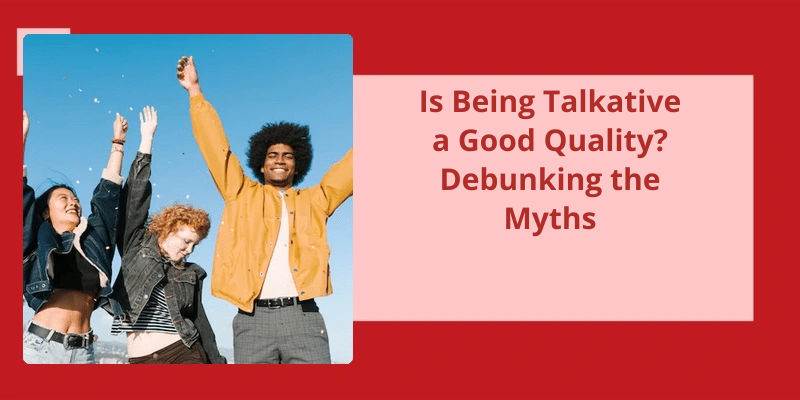The art of conversation is something that comes naturally to some people. Others, however, find it more challenging to express themselves verbally, preferring to remain silent and listen rather than speaking up. For those who’re naturally talkative, being able to express oneself verbally is a real advantage in life. Talkative people enjoy expressing their thoughts and feelings, engaging others in conversation and building strong relationships with those around them. While some may view being talkative as a negative trait, it can actually be a positive quality that can help individuals succeed in many aspects of life. From career success to personal relationships, being talkative can go a long way towards helping individuals achieve their goals.
Is Being Talkative a Good Trait?
However, there are times when excessive talkativeness can become problematic. This is often when individuals feel compelled to dominate conversations or constantly interject with their own opinions. This can come across as rude or self-centered, and can make others feel dismissed or ignored. In these cases, being talkative may not be seen as a positive trait and can damage relationships and social interactions.
On the flip side, being a good listener is often cited as an important aspect of effective communication. Active listening skills can help improve understanding, build trust, and foster deeper connections with others. Individuals who’re able to balance their talkativeness with active listening skills are often seen as thoughtful and engaging communicators.
In certain situations, such as professional settings, being talkative or verbose may not be advantageous. Despite what some may believe, talkativeness doesn’t always equate to intelligence or expertise. In fact, verbose individuals may struggle to relay complex information in a concise and clear manner. In these cases, it may be more beneficial to practice brevity and focused communication.
While some may see it as a strength in social settings, it may be less desirable in professional or academic environments. It’s important to be mindful of others perspectives and to practice good listening skills in order to effectively communicate and build positive relationships.
In addition to these benefits, talkative people can also bring a unique energy to any situation and can help to break the ice in social situations. However, it’s important to find a balance and not dominate conversations or talk over others. In this article, we will explore further the importance of talkative people and how to communicate effectively.
What Is the Importance of Talkative Person?
Further, talkative people can express their thoughts and ideas more easily, making them great communicators. They’re able to articulate their opinions and feelings confidently, which helps others understand them better. This can also lead to the development of more meaningful connections with others. Additionally, talkative people are often excellent storytellers, as they’re able to maintain others interest by captivating them with their words.
Moreover, talkative individuals tend to be more curious and engaged with their surroundings. They ask questions and actively seek out new experiences, leading them to be more knowledgeable and well-rounded individuals. This curiosity can also inspire creativity and innovation, as they explore new ideas and ways of thinking.
Another benefit of being a talkative person is that they can often diffuse tense situations with their communication skills. They’re able to talk through conflicts and find solutions that satisfy both parties involved. This is especially important in professional settings, where conflict resolution is an essential skill.
From enhanced communication skills to increased curiosity and creativity, talkative individuals have much to offer. So, next time you meet a talkative person, don’t shy away from them – they may just have something valuable to say.
Source: Is it Good to be Talkative? The Many Benefits of Talking
In a world where communication is key, being talkative can have it’s advantages. Not only can it help you form new relationships, but it can also help improve existing ones. Additionally, it can make social interactions more enjoyable and prevent any uncomfortable silences. But why exactly is being talkative so beneficial? Let’s take a closer look.
Why Is Being Talkative Good?
When it comes to socializing with others, being talkative can be an incredibly useful trait. Not only does it allow you to engage with others on a deeper level, but it can also open doors to new experiences, perspectives, and conversations you may not have otherwise had. By being talkative, we’re able to build rapport, establish connections, and create lasting relationships with the people we interact with.
This trait also allows us to be more comfortable in social situations, making it easier to navigate social norms and customs. Being talkative puts us in the drivers seat, allowing us to take control of the conversation and steer it in a direction that we’re comfortable with. Additionally, by being talkative, we can avoid awkward silences that may make the conversation feel forced or uncomfortable for both parties.
Talking opens up an endless array of possibilities for new experiences, ideas, and perspectives, allowing us to learn and grow with each conversation. By engaging in talks, we can broaden our horizons and challenge our preconceived notions about the world around us.
By talking more and engaging with more people, we can establish connections and relationships that last a lifetime, while also opening up endless possibilities for new experiences and growth. It can be challenging to break out of our shells and start talking more, but with practice, anyone can become a confident and outgoing conversationalist. So the next time you find yourself in a social setting, take a deep breath and start talking – you never know what great opportunities might be waiting for you just around the corner.
The way we describe someone can often carry a positive or negative connotation, but the term “talkative” itself is fairly neutral. It simply means that someone has a propensity to talk frequently and at length. However, how this trait is received by others can vary depending on the situation. Let’s explore this further.
Is Talkative a Negative Tone?
In some situations, a talkative person may be seen as social and friendly, someone with whom others can easily engage in conversation. It can be especially helpful in group settings, where there’s a need for easy rapport and a comfortable exchange of ideas.
On the other hand, in some contexts, being talkative can be seen as a negative trait. For example, when someone is excessively talkative, it can create an impression of someone who dominates the conversation, making it difficult for others to get a word in edgewise and thus not letting them express their opinions or thoughts freely.
Moreover, when someone is talkative to the point of being agitated or anxious, it can lead to misunderstandings and confusion. This may occur in professional situations where the pressure is on to resolve issues and provide clear, concise direction.
In personal relationships, being overly talkative can also cause problems. A talkative partner may interrupt the other person, undermining their confidence and making it harder to communicate effectively.
Overall, the tone associated with talkativeness largely depends on the specifics of the situation and context. Whether it’s seen positively or negatively might vary depending on who you ask and the circumstance in question. To some people, it’s both a good and a bad trait.
The Benefits of Being Talkative in Certain Social Situations
Being talkative in certain social situations can have numerous benefits. It can help you connect with people, build relationships, and increase your confidence. Additionally, being talkative can make you appear more approachable and interesting to others. However, it’s important to read the room and know when it’s appropriate to be talkative or when it’s better to listen and observe.
As we navigate through various social settings and personal needs, we often find ourselves contemplating whether it’s better to be talkative or quiet. While there’s no one-size-fits-all answer to this question, there are advantages and disadvantages to both. It’s important to understand these factors in order to determine what suits us best in any given situation.
Is It Good to Be Quiet or Talkative?
Many people associate talkativeness with confidence and extroversion, and this can be an advantage in many social and professional settings. Those who’re able to confidently express their ideas and engage in conversations tend to be perceived as charismatic and likeable. Additionally, being talkative can help you form strong relationships with others, as it allows you to demonstrate your interest and investment in them.
On the other hand, being quiet can also be a valuable trait. Those who’re more introverted or contemplative can often bring a depth of insight and perspective to conversations that others may not. Additionally, being quiet can allow you to listen more effectively, which can be a important skill in building strong relationships and making informed decisions.
Ultimately, whether it’s good to be quiet or talkative depends on the situation. For example, if you’re in a sales or business setting, being talkative and persuasive may be necessary for your success. Conversely, if you’re in a more introspective field like psychology or philosophy, being quiet and reflective may be seen as a strength.
Additionally, personality traits can also influence whether it’s better to be quiet or talkative. Some individuals are naturally more introverted and don’t feel comfortable being the center of attention. Therefore, being talkative in those situations may cause stress and discomfort. Conversely, extroverted individuals may feel stifled by being quiet and may need to express themselves through conversation in order to feel fulfilled.
It depends on the individual, the context, and the situation at hand. Ultimately, the key is to be self-aware and to recognize when it’s appropriate to be quiet and observe, and when it’s appropriate to be talkative and engage in conversation. By doing so, you can build strong relationships, make effective decisions, and ultimately succeed in whatever field you choose.
they feel they won’t have a chance to contribute. Additionally, being a chatterbox can make you appear self-absorbed or insensitive to others’ needs for quiet or privacy. In this article, we’ll explore the drawbacks of being too talkative in further detail.
What Are the Disadvantages of Being Talkative?
They simply cant get a word in edgewise. This can lead to fewer opportunities for building meaningful relationships and collaborations with others. In addition, being too talkative can make you come across as self-centered or arrogant, as if your ideas and opinions are the only ones that matter. This can be off-putting to others and make them less likely to engage with you.
Another disadvantage of being too talkative is that it can lead to misunderstandings and miscommunications. When you dominate conversations, you may not take the time to truly listen to what others are saying, or you may talk over them before they’ve finished expressing their thoughts. This can result in important details being missed or misunderstood, leading to problems down the line. Additionally, if you’re constantly talking, you may not take the time to fully understand the situation or problem at hand, leading to incomplete or ineffective solutions.
Talking too much can also be detrimental to your personal well-being. People who talk excessively may suffer from anxiety, as they’re constantly in the spotlight and feel the pressure to come up with something interesting or engaging to say. This can lead to burnout and stress, which can have negative impacts on both your physical and mental health. Additionally, if you’re constantly talking, you may not take the time to reflect on your own thoughts and feelings, leading to a lack of self-awareness and self-discovery.
Being too talkative can also be perceived as unprofessional in certain situations. For example, in a business meeting or presentation, it’s important to be concise and to the point, so as not to waste everyones time. If you’re constantly rambling or going off on tangents, you may lose the attention of your audience and come across as unprepared or unprofessional. This can have long-term consequences for your career and reputation.
Finally, being too talkative can hinder your ability to learn and grow. If you’re constantly talking, you may not take the time to listen to others and learn from their experiences and insights. This can prevent you from broadening your horizons and expanding your knowledge base, which can limit your personal and professional growth over time. By learning to listen more and talk less, you can gain a deeper understanding of the world around you and develop greater empathy and compassion for others.
Conclusion
Furthermore, talkative individuals can be highly skilled communicators and negotiators, able to think on their feet and adapt to their audience. They’ve a natural ability to connect with others, build relationships, and establish trust quickly. However, as with any quality, there’s a line that can be crossed where talkativeness can become a hindrance. It's important to strike a balance between sharing information and actively listening to others. Overall, being talkative can be a valuable asset when used appropriately and with intention.






